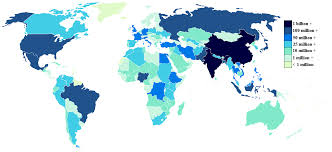中文词源
population 人口
来自populate,居住,构成人口,-ion,名词后缀。
英语词源
- population (n.)
- 1610s, from Late Latin populationem (nominative populatio) "a people; a multitude," as if from Latin populus "a people" (see people (n.)). Population explosion is first attested 1953.
权威例句
- 1. An earthquake hit the capital, causing panic among the population.
- 首都发生了地震,引发民众恐慌。
- 2. Food production has already fallen behind the population growth.
- 粮食生产已经跟不上人口增长。
- 3. A substantial proportion of the population speak a French-based patois.
- 人口中有一大部分说以法语为基础的混合语。
- 4. Environmentalists say a critical factor in the city's pollution is its population.
- 环境保护主义者说造成该城市污染问题的一个关键因素是其人口数量。
- 5. Britain has the largest and most flourishing fox population in Europe.
- 英国拥有欧洲最大也是最具繁殖能力的狐狸种群。

